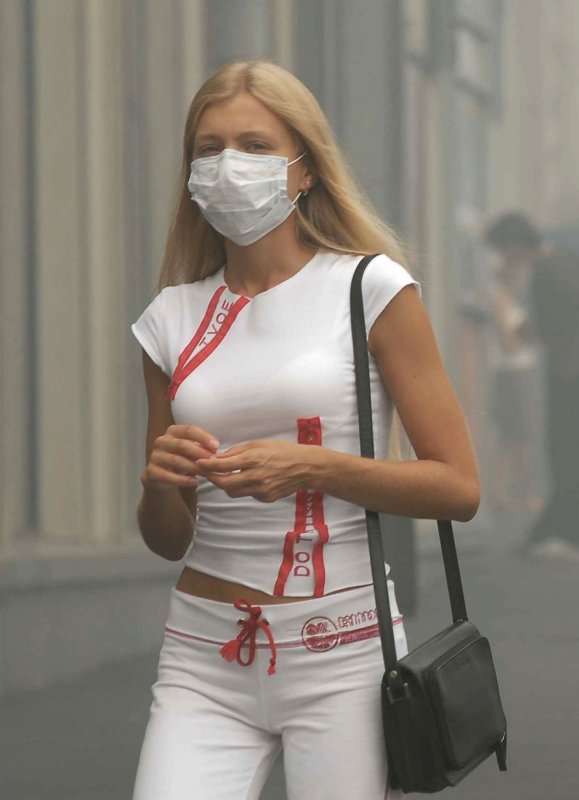1 of 13 | A woman wearing protective mask walks through a heavy smog in Moscow on August 6, 2010. Russian capital was blanketed in record thick smoke causing by temperatures up to 100 F (38 C) and several days of nearby forest and peat fires. UPI/Alex Volgin |
License Photo
MOSCOW, Aug. 6 (UPI) -- Moscow was shrouded in smoke Friday as authorities warned of a possible radioactive cloud that could form if the wildfires raging in Russia spread to an area contaminated by the Chernobyl accident.
The images emerging from Moscow Friday look like they were taken from a doomsday movie: A giant smoke cloud has made the landmarks including the Kremlin disappear, with the few commuters who have to leave their houses or cars moving around wearing face masks. The others stay inside, desperate to evade the worst smog in the capital since the fires started more than a week ago. Pollution in Moscow, experts warned, is four times above safe levels.
"It's a serious reason not just for the aged, children and pregnant not to go out into the street but also for people in good health," Yevgenia Semutnikova, of the pollution watchdog Mosekomonitoring, told the Rossiiskaya Gazeta newspaper.
The relentlessly spreading wildfires have devastated several regions south and west of the capital, despite a major firefighting operation that includes nearly 200,000 people and dozens of planes.
The fires have destroyed residential houses, military facilities, a significant share of Russia's wheat crops and as of Friday claimed the lives 52 people, authorities said.
And it could get much worse: Emergencies Minister Sergei Shoigu warned Friday that the fires in the Bryansk region might send into the air radioactive contamination locked in soil devastated by the Chernobyl nuclear reactor accident of 1986.
"If a fire appears there, the radioactive particles could fly away with the smoke and a new polluted area could appear," he said.
Moscow has already ordered the evacuation of nuclear and explosive material from Sarov, a top-secret nuclear facility in the Nizhny Novgorod region, which is one of the worst hit. Authorities also ordered the removal of missiles and other defense equipment from a munitions depot at Alabinsk southwest of Moscow.
There were at least 589 fires raging Thursday over 196,000 hectares, up from 529 fires Tuesday and 460 fires Monday.
Russia's agriculture sector has been worst affected. Thousands of hectares of farmland have been burned. Russian Prime Minister Vladimir Putin Thursday banned wheat exports until the end of the year, sending grain prices on international markets through the roof.
The fires are aided by a severe draught and the hottest summer since temperature recordings began 130 years ago.
Moscow saw its fifth daily temperature record in August Friday as the mercury soared to 96.8 degrees Fahrenheit, beating a record of 95.7 degrees F registered on Aug. 6, 1920, Russian news agency RIA Novosti reports.
Meteorologists warn there won't be a cool down anytime soon. They predict the heat wave to continue next week and possibly beyond mid-August.





